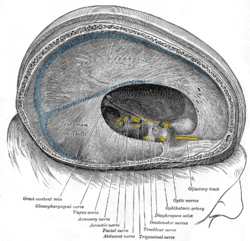Diaphragma sellae
| Diaphragma sellae | |
|---|---|
 Tentorium cerebelli seen from above. (Diaphragma sellae labeled at upper left.) | |
| Details | |
| Identifiers | |
| Latin | Diaphragma sellae |
| Dorlands /Elsevier | d_15/12293533 |
| TA | A14.1.01.107 |
| FMA | 78540 |
The diaphragma sellae or sellar diaphragm is a flat piece of dura mater with a circular hole allowing the vertical passage of the pituitary stalk. It retains the pituitary gland beneath it in the fossa hypophyseos as it almost completely roofs the fossa hypophyseos of the sella turcica, a part of the sphenoid bone. It has a posterior boundary at the dorsum sellae and an anterior boundary at the tuberculum sellae along with the two small eminences (one on either side) called the middle clinoid processes. The diaphragma sellae is innervated by the first division of the cranial trigeminal nerve.
Surgical Significance
Violation of the diaphragma sellae during an endoscopic endonasal transsphenoidal pituitary tumor resection will result in a cerebrospinal fluid leak.
Additional images
-

Dura mater and its processes exposed by removing part of the right half of the skull, and the brain.
-
Human brain dura mater (reflections)
References
This article incorporates text in the public domain from the 20th edition of Gray's Anatomy (1918)
External links
- Anatomy photo:28:14-0101 at the SUNY Downstate Medical Center - "Cranial Fossae: Diaphragma Sellae"
- Imaging at wfns.org
| ||||||||||||||||||||||||||||||